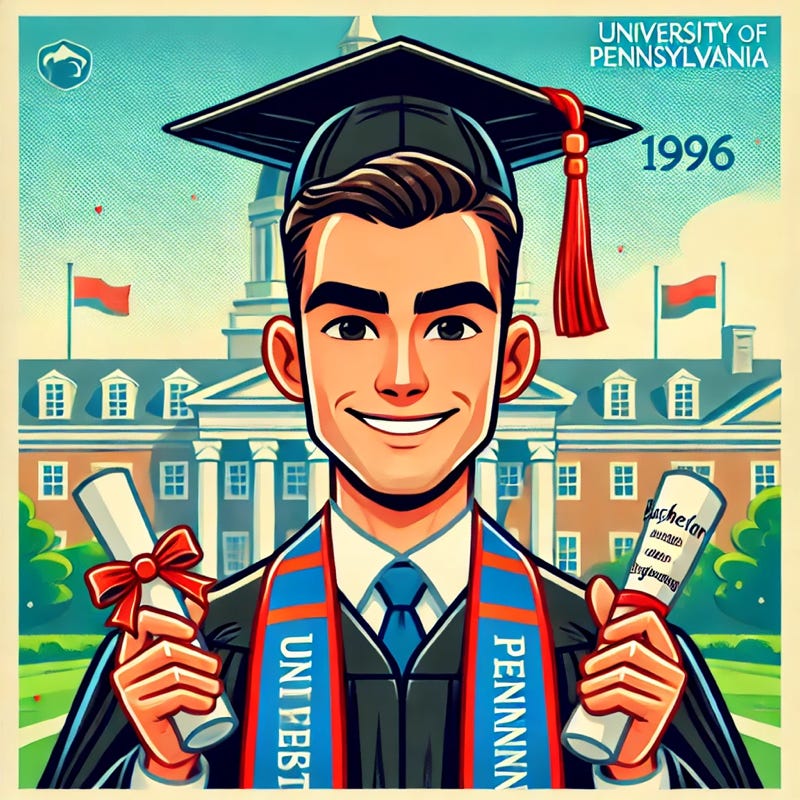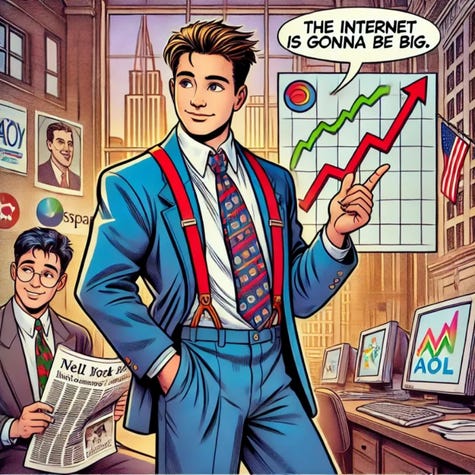Page 217 of My Autobiography
AI, IBD, and a Very Personal Tech Bet
Today (May 16) is my birthday. And May 19 is World IBD Day, which raises awareness for the 10 million people worldwide living with Crohn’s disease and ulcerative colitis.
These diseases have shaped—and reshaped—my life. They’ve impacted generations of my family, including my daughter. And now, through some unlikely turns involving Wall Street, the Internet, and artificial intelligence, I’ve come to realize that the most meaningful return I’ve gotten from my career might be health-related, not financial.
So in honor of my birthday, World IBD Day, and everyone touched by these illnesses, I’m asking you to contribute to “Take Steps” to raise funds for the Crohns & Colitis Foundation. It will help fund cures. And it might even help save someone like me. Here’s why this means so much to me…
I once wrote about the day I cured IBD. You’ll find it on page 217 of my 300-page autobiography.
To be clear: I did not cure IBD (inflammatory bowel disease). I was 17 years old. The essay was for my application to the University of Pennsylvania, and I’d suffered from ulcerative colitis—one of the two main forms of IBD—since I was 12. I described a future in which I’d solved the puzzle of a then-incurable disease known for abdominal pain, bloody diarrhea, and an assortment of other unpleasant features along with an increased risk of colon cancer. The essay helped me get into Penn. But in terms of long-term accuracy, it ranks near the bottom of my predictions. IBD, while manageable, remains incurable. But, like many of Les Prophéties du Porch(dog), if I’m vague enough and wait long enough, I will be kind of right about just about everything. So here’s a +35 year check-in….
Penn, Wall Street, and the Internet.
I graduated Penn in 1996 with degrees in engineering and economics from the M&T program after five years that included three hospital stays; 2 of which were directly related to IBD and one of which required a semester off.
I went to work on Wall Street after a summer internship in biotech equity research at Merrill Lynch showed me a shortcut to senior investment banking. It was at Merrill Lynch that I first learned about Centocor and its experimental biologic IBD drug CenTNF, later commercialized as the blockbuster drug Remicade (which put my daughter in her first remission after being diagnosed with Crohn’s Disease). Remicade opened the floodgates for dozens of other biologics for IBD (and other illnesses) like Humira (which my daughter takes now), Entyvio (which I take), and Rinvoq. (I also bought some Centocor stock, which proved fortunate after J&J bought the company for ~$5B.)
I stayed in equity research (and later buy side), but moved to TMT and became one of the first “Internet analysts” (i.e., bankers, then) at the ripe old age of ~25. This is when I made my first big call (“the Internet is gonna be big.”) That worked out nicely; the bubble burst, but there were enough banking fees prior and trades after to make that lucrative enough for me.
I stumbled into my second big call after starting two companies and “selling” one. This time it was social / mobile / cloud (retrospectively bucketed as “Web 2.0.”) I fell ass backwards into AWS where I co-built the startup team, which turned out nicely given AMZN’s stock run from ~$20/share in March 2014 when I joined to >$130/share in October 2023 when I left.
AI and My Colon.
It’s this latest (third) call that brings me (back) to page 217 of my autobiography. The third and most recent call is that because of AI, GPUs, and LLMs, we’re at the start of a multitrillion dollar infrastructure rebuild that fundamentally changes the way software is built. Unlike the previous two calls, I haven’t yet reaped material financial benefit (though private company investments and advisory work have put some irons in the fire). But a recent discussion with my GI doctor showed me that my work in the space, as small and tangential as it may be, is part of a macro move that has benefited me more than any of the financial returns from this and other calls. Lemme explain….
I have been in remission from IBD for decades. But the increased cancer risk from IBD is the consequence of (prior) chronic inflammation, which I’ve had in spades. (End of story: I don’t have cancer.) Advances in treatments and imaging have kept me remarkably safe, especially relative to what would have transpired in the past; e.g., aside from biologic medications that are more effective and carry fewer side effects than legacy therapies, novel imaging techniques like chromoendoscopy allow doctors to find and remove precancerous dysplasia before they get, well, less *pre*cancerous. I’ve had plenty of those incidences, which prior to chromoendoscopy would have resulted in radical surgery or worse.
A regularly scheduled colonoscopy in 2024 found a teeny (2mm) high grade dysplasia. This is the phase right before cells become cancerous. It was removed. It is gone. But it certainly put my doctors on higher alert for finding things before they get dangerous. What I didn’t realize before this month was that the aforementioned high grade dysplasia had been identified by artificial intelligence. Not by a GI doctor doing the inspection. Not by the radiologists and pathologists observations of the images. But by AI trained to find irregular cells earlier than possible by other (more human) approaches. If this had not been identified by AI and removed by my doctor, it is more possible it could have required more radical surgery or developed into colon cancer.
So no I did not cure IBD….
Nor did I have anything to do with the advancements in IBD treatment. (Letting doctors “borrow” my colon once or twice a year to improve imaging and diagnostic techniques in exchange for keeping me healthy doesn’t count.) But thanks to investments in science—including in AI—we’re closer than ever to both a cure and better treatment. While my participation in advancing artificial intelligence may be limited to nonexistent and even more so as it relates to AI in IBD, continued investment in the space is certain to bring us closer to better patient outcomes and even a cure.
Take Steps Toward Cures For IBD.
This is also one of the reasons why I support the Crohn’s & Colitis Foundation so enthusiastically. (The other two primary reasons for my support are for my own health future and, most important to me, my daughter’s battle with Crohn’s Disease.) The CCF has been involved in every major research breakthrough in the field and supporting the foundation is among the most effective ways to help those of us that suffer from these diseases.
On June 7th, we will once again “Take Steps” to raise funds for the Crohns & Colitis Foundation, with the ultimate goal of finding a cure. IBD has impacted our family for generations – grandparents, parents, siblings, cousins, and others have suffered or suffer from the diseases. It is profoundly personal to us, which is why we’re personally requesting that you contribute. (And the Levy family will match the largest donation to our team.) We have been touched by the extraordinary efforts of the medical community to support us. Please help so that, together, we can support the crucial work of the Crohn’s & Colitis Foundation. Your donation to our fundraising efforts will help the Foundation invest in cures for the future, while providing support to patients today, including so many across our family. And if you're in the Boston area, please come join our team and let's walk together.
Plus, it’s my birthday - so happy birthday to me 🎂




